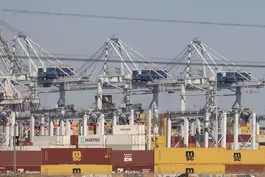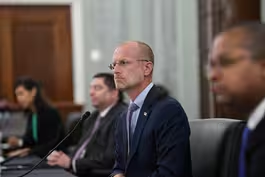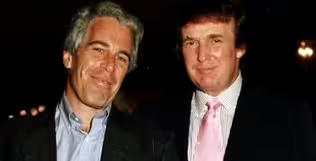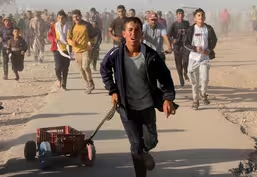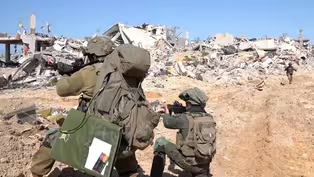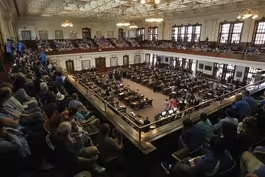
Ex‑CIA analyst slams Trump’s effort to deny Russia probe
Clip: 7/31/2025 | 11m 45sVideo has Closed Captions
Ex-CIA analyst challenges Trump's attempt to discredit Russian election interference probe
The Trump administration is trying to discredit the intelligence assessment that concluded Russian President Putin ordered a campaign to interfere in the 2016 election with the intent of helping elect Trump. Contrary to almost all intelligence findings, Trump and his aides allege a conspiracy by the Obama White House. Geoff Bennett discussed more with former CIA analyst Michael Van Landingham.
Problems playing video? | Closed Captioning Feedback
Problems playing video? | Closed Captioning Feedback
Major corporate funding for the PBS News Hour is provided by BDO, BNSF, Consumer Cellular, American Cruise Lines, and Raymond James. Funding for the PBS NewsHour Weekend is provided by...

Ex‑CIA analyst slams Trump’s effort to deny Russia probe
Clip: 7/31/2025 | 11m 45sVideo has Closed Captions
The Trump administration is trying to discredit the intelligence assessment that concluded Russian President Putin ordered a campaign to interfere in the 2016 election with the intent of helping elect Trump. Contrary to almost all intelligence findings, Trump and his aides allege a conspiracy by the Obama White House. Geoff Bennett discussed more with former CIA analyst Michael Van Landingham.
Problems playing video? | Closed Captioning Feedback
How to Watch PBS News Hour
PBS News Hour is available to stream on pbs.org and the free PBS App, available on iPhone, Apple TV, Android TV, Android smartphones, Amazon Fire TV, Amazon Fire Tablet, Roku, Samsung Smart TV, and Vizio.
Providing Support for PBS.org
Learn Moreabout PBS online sponsorshipGEOFF BENNETT: The Trump administration is trying to discredit the intelligence community's 2016 assessment that concluded Russian President Vladimir Putin ordered an operation to interfere in the U.S. election that year with the intent of helping elect Donald Trump.
Contrary to intelligence findings, President Trump and his aides allege a broad conspiracy by the Obama White House to subvert Trump's win, and they allege what they call a yearslong coup against Mr. Trump.
The Justice Department announced last week it has created a so-called strike force to look into legal steps against former President Obama and intelligence officials who served in his administration.
TULSI GABBARD, U.S. Director of National Intelligence: There is irrefutable evidence that detail how President Obama and his national security team directed the creation of an intelligence community assessment that they knew was false.
GEOFF BENNETT: An intelligence report written nearly a decade ago back in the spotlight.
Director of National Intelligence Tulsi Gabbard last week took aim and looked to cast doubt on the intelligence community assessment ordered by then-President Barack Obama after Donald Trump won the 2016 presidential election.
President Trump now relitigating the 2016 campaign and seeking to undermine the assessment while facing ongoing questions about the Jeffrey Epstein case.
The report's purpose, to document what was known about how and why Russia interfered to help Mr. Trump win.
An unclassified version of the report concluded: "Russian President Vladimir Putin ordered an influence campaign in 2016 to undermine public faith in the U.S. democratic process, denigrate Secretary Clinton and harm her electability and potential presidency."
The report also said: "We further assess Putin and the Russian government developed a clear preference for president-elect Trump."
It's the last part of the assessment that Gabbard and the Trump administration are challenging.
Last week, Gabbard released a newly declassified report issued in 2020 by the Republicans on the House Intelligence Committee in which Gabbard says shows how the 2016 intelligence assessment had significant tradecraft failings, was unnecessarily rushed and subjected to inadequate review and coordination.
TULSI GABBARD: There was a gross politicization manipulation of intelligence by the Obama administration intended to delegitimize President Trump even before he was inaugurated.
GEOFF BENNETT: President Trump going further, saying President Obama had committed a crime.
DONALD TRUMP, President of the United States: The leader of the gang was President Obama, Barack Hussein Obama.
He's guilty.
It's not a question -- I like to say, let's give it time.
It's there.
He's guilty.
They -- this was treason.
GEOFF BENNETT: An Obama spokesperson pushing back, calling the claim outrageous, adding: "These bizarre allegations are ridiculous and a weak attempt at distraction."
Earlier this week the CIA under Director John Ratcliffe issued its own review of the 2016 intelligence assessment.
It said senior involvement likely influenced participants and ultimately compromised analytic rigor.
In 2018, the Senate Intelligence Committee issued a bipartisan review of the 2016 intelligence community assessment.
They concluded that it "reflects proper analytic tradecraft despite being tasked and completed within a compressed time frame, and that the committee heard consistently that analysts were under no politically motivated pressure to reach specific conclusions."
MARCO RUBIO, U.S. Secretary of State: I think you deserve a lot of credit.
GEOFF BENNETT: The committee vice chair at the time was Senator Marco Rubio, who now serves as both secretary of state and national security adviser.
At the time, he agreed with the findings.
MARCO RUBIO: The intelligence community has assembled probably an unparalleled amount of evidence in regards to the Russian not just efforts to interfere in 2016, but ongoing efforts to interfere in American society.
GEOFF BENNETT: For perspective on all of this, I spoke earlier with Michael van Landingham.
He was a Russia political analyst at the CIA and was one of the lead authors of the intelligence community's assessment of Russia's interference in the 2016 election.
So Tulsi Gabbard and others have claimed that the Obama administration directed the creation of a report they knew to be false.
From your vantage point as the primary drafter of it, was there any top-down political pressure to reach a certain conclusion?
MICHAEL VAN LANDINGHAM, Former CIA Russia Political Analyst: No, not at all.
I don't think the authors were handpicked in any way by political appointees.
We were all people who were familiar with the material before and had an idea of what we would write, how we'd write it.
And we never received any instruction from anyone above us about how to put that into a final report.
GEOFF BENNETT: This was also a rapid turnaround report completed in a matter of weeks, and there are people who say that that's evidence that it was rushed or politically motivated.
Did the speed in any way result in sloppy?
MICHAEL VAN LANDINGHAM: I don't believe so.
And I think both -- the Senate Select Committee on Intelligence has found that the paper used proper tradecraft.
The speed was unfortunate, but the president asked for it to be completed on that timeline.
And as the head of the intelligence community, the president usually receives what he or she asks for.
GEOFF BENNETT: House Republicans, as you well know, they reject the court judgment that Vladimir Putin favored Donald Trump.
Walk us through the constellation of evidence that supports that conclusion.
MICHAEL VAN LANDINGHAM: The House issued a partisan assessment of our intelligence community assessment in 2017.
That was recently declassified.
The House took issue with only one judgment.
In fact, they said we used proper tradecraft to reach the other judgments about Russian hacking of U.S. political organizations, the Russian influence campaign ordered by President Putin.
It was just on the one political motivation.
For us, the primary evidence to get to Putin's mind-set was a clandestine source that said, essentially, when Putin realized that Clinton would win the election, he ordered an influence campaign against Hillary Clinton because Trump, on whose victory he was counting, seemed less likely to win.
Then we saw a series of events that happened with the hacked U.S. materials by the Russian special services or intelligence services to leak those materials similar to the information a clandestine source had provided.
At the same time, we saw lots of members of the Russian media portraying Donald Trump in a more positive light.
Putin also had very negative things to say about Hillary Clinton from his experience with her as secretary of state.
And, along with that, there was other information that was collected by the U.S. intelligence community that gave us more confidence in that.
So, over time, looking at those things, having a high-quality, clandestine source telling you that Putin was counting on Trump's victory, having members of the Russian state saying Trump would be better to work with because of his views on Russia that don't represent the U.S. establishment, all of those things gave us high confidence that Putin wanted Trump to win, as did his comments in Helsinki in 2018 in July, where, when asked, he said: "Yes, I wanted him to win."
GEOFF BENNETT: How did the Steele dossier factor into your work?
And how do you respond to the persistent claims from Republicans that it shaped the core of the assessment's findings?
MICHAEL VAN LANDINGHAM: It's unfortunate that that is the perception, and I don't believe it's true at all.
The CIA, almost up to the senior management level, did not want to include the Steele dossier or the material that was included.
We had almost completed the paper when we received this Steele dossier.
Of course, there were press reports floating around.
Lots of people in Washington, D.C., had seen fragments of it because of the provenance of the information.
But when we received it, I was vehemently against including it, as were my co-authors and many other members.
But it was one of those things that I guess was at a higher level negotiated to be put into an annex.
None of the information, if you want to call it that, in the Steele dossier was included as evidentiary points in the broader body of the intelligence community assessment.
It was in the annex so that it could be briefed to the president-elect and others in the most highly classified version to, I guess, make people aware of this compilation of rumors and low-quality information.
GEOFF BENNETT: There's a lot of confusion about what the intelligence assessment does not claim, and that's that Russia actually changed votes.
Clear that up and help us understand why you think that has gotten lost in this political debate.
MICHAEL VAN LANDINGHAM: Yes, so some of the documents released recently by the Office of the Director of National Intelligence alleged that the ICA kind of cooked the books on the assessment that Russia meddled in the election because a previous intelligence community assessment said that Russia did not have the sort of access to vote counting systems, vote tallying systems that could affect the final count.
Bodies like the FBI and the Department of Homeland Security that are in charge of cybersecurity and those things made the call that the Russian hacking of local election systems, state and local election systems, were not of systems that would be involved in vote tallying.
GEOFF BENNETT: Looking back now, what's your assessment of the intelligence community assessment?
This is a document that has been scrutinized, politicized, investigated for nearly a decade.
Would you change anything?
MICHAEL VAN LANDINGHAM: I don't think so.
The people I worked with at all three agencies, the NSA, FBI and the CIA, did their best work.
And I think the reason why the paper has withstood seven or so investigations, whether criminal, like the Durham investigation, or political, like the Senate Select Committee on Intelligence investigation, or, most recently technical, the CIA's tradecraft review, all of those things have affirmed the quality of the paper.
I am glad that we said that we had high confidence in the information, because I thought that at the time we should say what we mean.
And we meant that Putin wanted Donald Trump to get elected.
And so when, at the Helsinki press conference in 2018, Putin was asked, did you want Donald Trump to win, and he says, in Russian verbatim, "Yes, I wanted him to win."
VLADIMIR PUTIN, Russian President (through translator): Yes, I did, because he talked about bringing U.S. relations back to normal.
MICHAEL VAN LANDINGHAM: ... it felt like vindication.
But I think that, if you look at the evidence on which it's based, which is now mostly declassified, and you're looking at it from a fair-minded point of view, with the benefit of all of the documents that have since come out, in addition to the social media activity hacking and investigations into U.S. person activity, such as Mueller investigation, you will see that there was something going on.
That doesn't necessarily mean that the president was involved in that criminal conspiracy.
But it does mean that Russia attempted to influence the election.
GEOFF BENNETT: Michael van Landingham, thank you again for your time and for your insights.
MICHAEL VAN LANDINGHAM: Thank you.
Economist analyzes Trump's tariff policy deadline approaches
Video has Closed Captions
Clip: 7/31/2025 | 6m 32s | Economist analyzes Trump's trade deals as tariff deadline approaches (6m 32s)
FCC’s Carr says network oversight a needed course correction
Video has Closed Captions
Clip: 7/31/2025 | 9m 40s | FCC chairman says network oversight offers a needed ‘course correction’ (9m 40s)
How Trump's answers about fallout with Epstein have evolved
Video has Closed Captions
Clip: 7/31/2025 | 6m 26s | How Trump's answers about his fallout with Epstein have evolved (6m 26s)
News Wrap: White House sending officials to inspect Gaza aid
Video has Closed Captions
Clip: 7/31/2025 | 4m 56s | News Wrap: White House sending 2 officials to inspect Gaza food distribution (4m 56s)
Shaheen on vote to block Israeli arms: Things need to change
Video has Closed Captions
Clip: 7/31/2025 | 6m 35s | Sen. Shaheen on why more Dems voted to block weapons to Israel: 'Things need to change' (6m 35s)
The Texas redistricting battle and its midterm impact
Video has Closed Captions
Clip: 7/31/2025 | 5m 23s | The Texas redistricting battle and its impact on next year’s midterms (5m 23s)
Providing Support for PBS.org
Learn Moreabout PBS online sponsorshipSupport for PBS provided by:
Major corporate funding for the PBS News Hour is provided by BDO, BNSF, Consumer Cellular, American Cruise Lines, and Raymond James. Funding for the PBS NewsHour Weekend is provided by...
